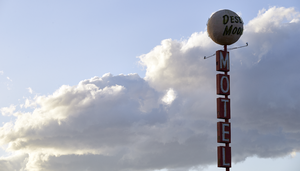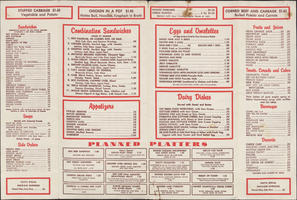Search the Special Collections and Archives Portal
Search Results
Marjory Gusewelle Phillips oral history interview
Identifier
Abstract
Oral history interview with Marjory Gusewelle Phillips conducted by Jodie C. Tenuta on May 11, 1976 for the Ralph Roske Oral History Project on Early Las Vegas. In this interview, Phillips discusses growing up in Las Vegas, Nevada and describes various recreational activities throughout the city. Phillips then discusses the significance of the Helldorado Parade to locals and how the parade brought the community together. Phillips later recalls watching the Boulder (Hoover) Dam being constructed and the events around the opening of the dam.
Archival Collection
Margaret Riskin oral history interview
Identifier
Abstract
Oral history interview with Margaret Riskin conducted by Anna Huddleston on August 12, 2014 for the West Charleston Neighborhoods: an Oral History Project of Ward 1. In this interview, Riskin discusses living in Las Vegas, Nevada since 1993. She talks about moving into a home in the Scotch 80s neighborhood, her neighbors, and the home owner association for the neighborhood. Riskin describes security concerns in the Scotch 80s, experiencing a home robbery, and why she decided to relocate. Lastly, Riskin discusses community events held in her neighborhood.
Archival Collection
Jean Olen Papers
Identifier
Abstract
The Jean Olen Papers (1994-2008) document Olen's career as a taxicab driver in Las Vegas, Nevada. Materials include Olen's personal taxicab driver's permit, medical examiner certificate, and other placards found in taxicabs regarding common questions, such as tipping, no smoking, and airport fees. Also included are newspaper clippings about taxicab drivers in Las Vegas, Nevada and four issues of
Archival Collection
Richard and Gertrude Rudiak with Dani Ramage oral history interview
Identifier
Abstract
Oral history interview with Richard and Gertrude Rudiak with Dani Ramage conducted by Barbara Tabach on December 30, 2015 for the Southern Nevada Jewish Heritage Project. Richard talks about his father, who was an early Nevada Assemblyman and a civil rights activist. Gertrude discusses her hobby of playing the pipe organ, teaching in both secular and Jewish education, and being on many community boards.
Archival Collection
Sharon Maurer-Schwartz oral history interview
Identifier
Abstract
Oral history interview with Sharon Maurer-Schwartz conducted by Barbara Tabach on February 01, 2016 for the Southern Nevada Jewish Heritage Project. Maurer-Schwartz, with her wife Edna Rice, talks about being part of the gay/Jewish life together over the years including in Las Vegas, Nevada. Both women discuss why they moved to Nevada and the early days of The Center, an LGBT center, which hosted a Passover Seder.
Archival Collection
Dr. Joseph Rojas oral history interview
Identifier
Abstract
Oral history interview with Dr. Joseph Rojas conducted by Suzanne Lubritz on February 25, 1980 for the Ralph Roske Oral History Project on Early Las Vegas. In this interview, Rojas describes his career as a gynecologist in Las Vegas, Nevada after being stationed at Nellis Air Force Base as chief of OBGYN during his time enlisted in the U.S. Air Force. Rojas also discusses how health care and medicine has evolved in Las Vegas, and Nevada as a whole.
Archival Collection
Geneva Stark Merwin oral history interview
Identifier
Abstract
Oral history interview with Geneva Stark Merwin conducted by Elizabeth Nelson Patrick on August 24, 1983 for the Ralph Roske Oral History Project on Early Las Vegas. In this interview, Merwin discusses her career and experiences as a teacher in Pahrump, Nevada after moving there in 1941. Merwin also discusses some of the people in the town and its layout. Merwin goes on to describe her teaching career in Las Vegas, Nevada after being recommended to the school board by Maude Frazier.
Archival Collection

Anita Tijerina Revilla oral history interview: transcript
Date
Archival Collection
Description
Oral history interview with Anita Tijerina Revilla conducted by Marcela Rodriguez-Campo on October 09, 2018 for the Latinx Voices of Southern Nevada Oral History Project. In this interview, Revilla discusses her early life in San Antonio, Texas. She talks about her decision to make education a priority, figuring out the college application process on her own, and her initial interest in social justice. Revilla talks about how her critical consciousness was developed, and her pedagogical approach to teaching. Revilla describes her role in the 2006 May Day march, advocating advocating for the queer community, and disrupting oppressive systems to increase educational access for students. Lastly, Revilla discusses ethnic studies and the history of inequality in the United States.
Text

Photographs of Desert Moon Motel sign, Las Vegas (Nev.), April 18, 2017
Date
Archival Collection
Description
Site name: Desert Moon Motel (Las Vegas, Nev.)
Site address: 1701 Fremont St
Sign owner: Jerzy and Celina Kosla
Sign details: The building was constructed in 1942 (Assessor). According to one commentator, the Desert Moon motel opened on the site in 1952 (Roadside Architecture.com). The cars on a vintage postcard of the motel appear to date from the late 1940's or early 1950's (Ebay). The same vintage postcard (Ebay) shows the motel as a member of United Motor Courts, an early motel referral chain founded in 1933 which published a travel guide until the early 1950's (Wikipedia). Based in Santa Barbara, California, United Motor Courts was made up of "a friendly group of independent owners of motor lodges..." (Historic Highways). The Quality Inn motel franchise was a spinoff of United Motor Courts (Wikipedia). The motel has been renovated by its current owner, Polish immigrant George (Jerzy) Kosla (Glionna, 2017).
Sign condition: The sign is Condition 4, good. The paint appears slightly faded but there is no flaking or peeling. The cabinets, reader boards, and fiberglass moon are all in good condition. The neon is intact.
Sign form: Pole sign
Sign-specific description: The sign pole and metal cabinets are painted pink. The design and lettering are the same on both sides of the sign. The trapezoid-shaped lower cabinet extends horizontally toward the street. It contains a rectangular white plastic lightbox which states "FREE ADULT MOVIES" in red sans serif letters and "FLAT SCREEN TV'S in smaller black san serif letters. To the left of the letters is the black silhouette of a female figure. On the metal below the plastic screen are clear sans serif neon letters which spell out, "NO VACANCY" in red when illuminated. The upper metal cabinet hangs from the street side of the pole. White painted san serif letters, covered by clear sans serif neon letters which glow red when illuminated, run vertically down the cabinet to spell out, "XXX MOVIES". Five metal cabinets attached to the street side of the sign run vertically to spell out, "M-O- T-E- L" in white painted sans serif letters covered by yellow sans serif neon letters. On top of the pole is a white p
Sign - type of display: Neon, Lightbox
Sign - media: Steel, Plastic, Fiberglass
Sign - non-neon treatments: Lightbox
Sign environment: East Fremont Street, surrounded by other motels.
Sign - date of installation: c. 1950s
Sign - date of redesign/move: The now pink or faded red sign cabinets were painted blue in a 2003 photograph
Sign - thematic influences: Desert, Space Age, Western
Sign - artistic significance: The current sign appears to have taken the Western/Lunar theme from the previous sign and transformed it into a 1950's/1960's Space Age/Lunar theme
Survey - research locations: Assessor's website
Survey - research notes: Ebay. Las Vegas NV Desert Moon Motel roadside Nevada vintage linen postcard ca 1940s. Retrieved from https://picclick.com/LAS-VEGAS- NV-Desert- Moon-Motel- Roadside-Nevada- 141923576051.html Glionna, J. M. (2017 April 23). Motel, once a haven, now a crime-ridden jungle in downtown Las Vegas. Las Vegas Review Journal. Retrieved https://www.reviewjournal.com/local/local-las- vegas/downtown/motel-once- a-haven- now-a- crime-ridden- jungle-in- downtown-las- vegas/ Historic Highways. (2007 July 14). Archive for the "Motel Associations" category: Looking for a motel in 1933. Retrieved from https://historichighways.wordpress.com/category/motel-associations/ Roadside Architecture. com (n.d.). Las Vegas Signs: Desert Moon Motel. Retrieved from http://www.roadarch.com/signs/nvvegas.html RoadsidPeek.com. (n.d.). Downtown motels Las Vegas: Desert Moon Motel. Retrieved from http://www.roadsidepeek.com/roadusa/southwest/nevada/vegas/lvmotel/lvdownmotel/index5.htm Wikipedia. (n.d.). Motel: 2.6 R
Survey - other remarks: A postcard circa early 1950's features a different sign with a saguaro cactus and quarter moon (Ebay). The current sign appears to have taken the Western/Lunar theme from the previous sign and transformed it into a Space Age/Lunar theme, which may indicate that the sign dates from the date from the late 1950's or 1960's.
Surveyor: Mitchell Cohen
Survey - date completed: 2017-08-22
Sign keywords: Neon; Steel; Plastic; Fiberglass; Pole sign; Light box; Sculptural
Mixed Content

